#Prosopagnosia
Explore tagged Tumblr posts
Text
au where xie lian has face blindness and legitimately can’t tell the difference between most of hua cheng’s forms. but he always knows it’s his husband because he can hear him jingling whenever he moves
#tgcf#tian guan ci fu#heaven official's blessing#xie lian#hua cheng#hualian#face blindness#prosopagnosia
447 notes
·
View notes
Text
so something I've noticed within a lot of fandoms is that people will post their "neurodivergent" headcanons. which is fine ofc, however when they say "neurodivergent" they are typically only referring to autism or ADHD. maaaayybbee ptsd if the character(s) are "traumatized enough" (by that I mean, there's typically one who everyone uwuifies and infantilizes because their trauma is most prominently on display within the media). a common headcanon that often fails to address the trauma of other characters, or that trauma doesn't always manifest itself as PTSD/C-PTSD.
point being, while there's nothing wrong with headcanoning characters with these (autism, adhd, ptsd), maybe...do research? branch out more? imagine how nice it would be if suddenly large amounts of people were not only educated about other lesser-known forms of neurodivergence (ocd, did, npd, bpd, aspd, schizotypal disorders, etc.) but destigmatized them by giving these headcanons to well-loved, popular characters (rather than the villains or antagonists, or even just less popular or even hated characters). (and hey, if you didn't know, schizophrenia and autism can present similarly)
(that being said please do research before you head canon something stigmatizing or ableist.)
it could pave the way for real, genuine, non-stigmatizing or demonizing representation.
and this could probably be a separate post but I wanted to include it here as well:
POC CHARACTERS CAN BE NEURODIVERGENT. POC CHARACTERS ARE ALSO AUTISTIC, ALSO HAVE ADHD, OCD, AND MORE!! STOP LEAVING THEM OUT, STOP ONLY HEADCANONING THE WHITE PROTAGONISTS AS AUTISTIC.
Thank you for coming to my TED talk, please feel free to add on
#feel free to add more tags#neurodivergent#ocd#bpd#did#osdd#npd#aspd#schizophrenia#schizotypal personality disorder#schizoaffective#dyslexia#dyspraxia#dyscalculia#dysgraphia#prosopagnosia#synesthesia#tourettes#hpd#dysnomia#autism#adhd#actually neurodiverse#actually autistic#textpost#headcanon#the owl house#percy jackson#riordanverse#good omens
499 notes
·
View notes
Text
Prosopagnosia
As someone who has prosopagnosia, I love the way it's portrayed in Brilliant Minds. If you don't know much about the condition, here's some things that might be interesting:
Even though it's called face blindness, face blind people can actually see faces. I see this misconception a lot, and the way they show it from Wolf's perspective kinda reinforces that, but faces aren't actually just blobs. We can see noses, eye colour, mouths, all the features, we can see anything you see. It's just that the faces don't really register as belonging to someone. I see your face, but I don't recognise you in it.
Connected to that, people with prosopagnosia can also read facial expressions, though many do struggle with it a bit, especially with the subtle ones. A lot of face blind people, myself included, do have autism, so it might have to do with that, too.
Depending on how face blind you are, you can actually learn to recognise faces to some extent. My prosopagnosia is quite severe, though not as severe as Wolf's, I think, and I do recognise my parents and my siblings by looking at their faces. However, I usually have to double check by looking at the distinguishing feature I recognise them by. Wolf probably recognises Carol as easily.
That distinguishing feature thing, by the way? Absolutely spot on. We do that.
Context is really important for face blind people. I recognise my colleagues, whom I see every day, quite easily, if I see them at work, where I expect them to be. I still don't recognise them by their faces, but I see them and know immediately who they are. If I see them somewhere other than at work, I won't recognise them unless they make themselves known to me. That's why it makes sense to me that Wolf's prosopagnosia doesn't come up in the later episodes. We see him mainly at work, mainly interacting with people he expects to see in that context.
The more tired you are, the harder it gets to recognise people. It's kinda obvious, but recognising people if your brain can't do that at a glance requires quite a lot of energy. So if you're tired, you can't recognise people you usually know.
It's much more difficult to recognise people in pictures. I don't know anyone in a picture. I don't even know myself in a picture. It's mind blowing to me that people recognise people in real life after only seeing pictures of them.
Face blindness can lead to anxiety. I used to be constantly worried that people think I'm ignoring them. It can make you nervous to even leave the house.
On the other hand, people at work think I'm very friendly, because I always say hi to everyone. I do that in case they're someone I should know.
132 notes
·
View notes
Text
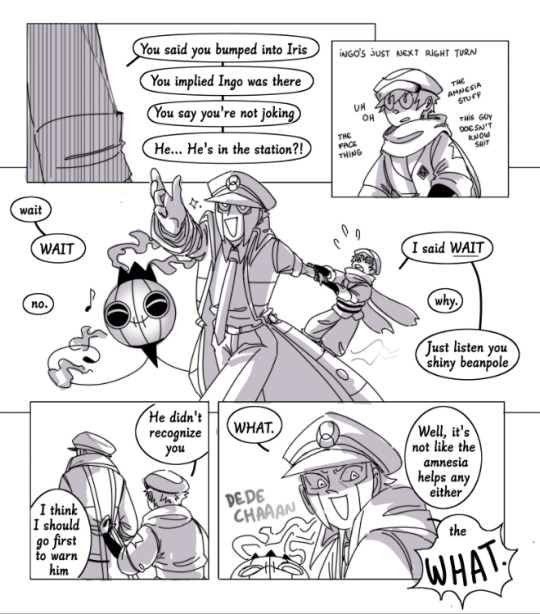
First | Previous | Next
Rei has no filter
#submas#subway bosses#submas au#subway boss emmet#emmet#pla rei#rei#chandelure#post pla#pla au#my art#prosopagnosia#giving Emmet whiplash is my favorite hobby
843 notes
·
View notes
Text
youtube
I'm faceblind! I've wanted to make a vid on it for a long time.
It's a bit of me discussing what faceblindness is, how it feels, how it impacts my life, and then most of it is my flatmate reminding me of the price of hubris with a fun quiz.
Play along at home! This video is already diagnosing people.
#YouTube#Faceblind#Faceblindness#Prosopagnosia#video#Wooooo. It's unlikely I can film lightlark3 tomorrow but maybe. Or I start on it.#If not sat
105 notes
·
View notes
Text
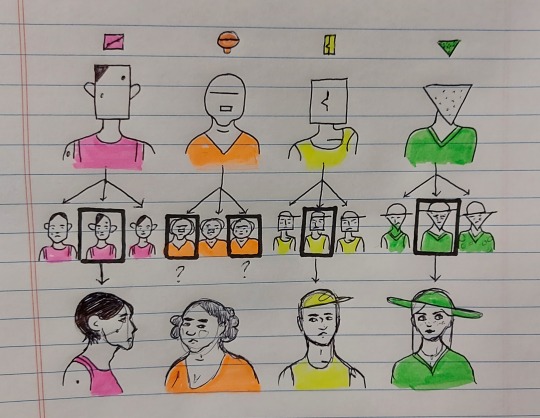
I don't know how to explain, but I'm face blind, I could recognize this stranger anywhere, those wildly different people look identical, and I don't know who you are
483 notes
·
View notes
Text
Prosopagnosia (face blindness)
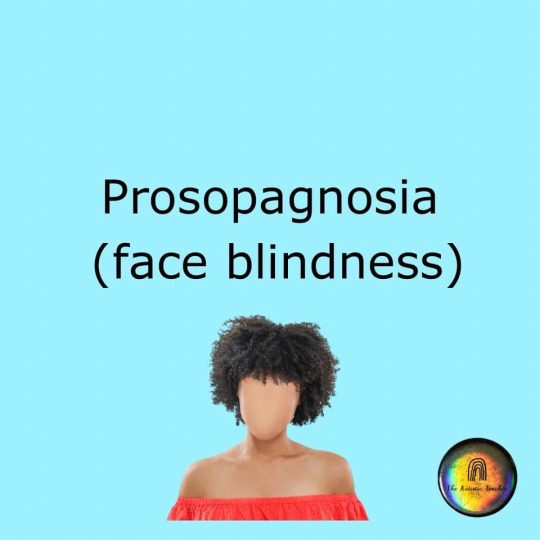
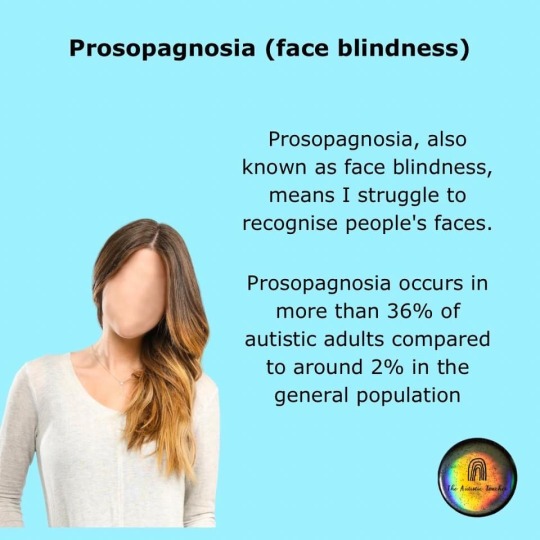
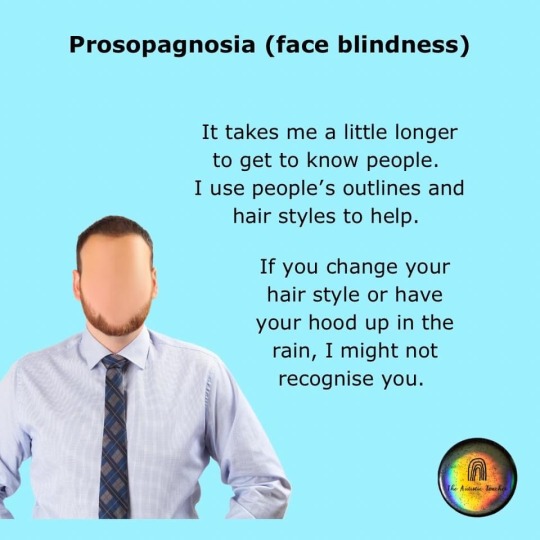

The Autistic Teacher
#autism#actually autistic#face blindness#prosopagnosia#autism traits#signs of autism#autism signs#neurodivergence#neurodiversity#actually neurodivergent#feel free to share/reblog#The Autistic Teacher (Facebook)
272 notes
·
View notes
Text
i've been thinking about The Kiss™ all week. as the music swelled, i could feel it about to happen. wolf crossed the street, and all i could think was "what if that's not josh?"
but wolf was so certain~ his face was so open, alight with hope and determination. it felt reckless and brave... and inevitable.
all i can think about now is the careful attention it must take to memorize someone by everything but their face.
how closely would you have to study someone to truly *see* them?
how can you know someone's small details by heart? memorizing the slope of their jaw, exactly where they part their hair, the size & shape of their hands? how their collar pops or is tucked away, what shoes they wear? how they stand while waiting for their coffee on a street corner? how often do we look at someone and only see their face, not taking in the essence of the whole person?
how carefully would you have to study someone, with awe and wonder, to know them so deeply that you could find them in a passing glance?
how many of these questions do you think wolf had to answer in that small window of time to truly know the man he was about to kiss?
#brilliant minds#brilliant minds spoilers#the man from grozny#brilliant minds 1x07#wolfnichols#oliver wolf#josh nichols#face blindness#prosopagnosia
59 notes
·
View notes
Text






























disability pride month userboxes part 2/5
posted these on insta throughout the month :3
#disabled#disability pride month#prosthetics#did#ptsd#arthritis#down syndrome#bipolar 2#dermatillomania#dysthymia#palilalia#anxiety#gad#depression#scoliosis#endometriosis#ehlers danlos syndrome#pcos#prosopagnosia#crutches#glasses#heart condition#chronic fatigue#chronic pain#maladaptive daydreaming#ed#learning disability#tourettes#substance addiction#respiratory disorder
93 notes
·
View notes
Text
Prosopagnosia/face blindness = a condition where you have difficulty recognizing people's faces.
–
We ask your questions so you don’t have to! Submit your questions to have them posted anonymously as polls.
#polls#incognito polls#anonymous#tumblr polls#tumblr users#questions#polls about sleep#submitted nov 25#polls about brains#prosopagnosia#face blindness#face blind#sleep#dreams#dreaming
268 notes
·
View notes
Text
How to Support People With Faceblindness/Prosopagnosia Online
This isn't super important. I'm pretty sure I'm not the only faceblind person whose response to not recognizing people was to stop caring about celebrities (and most live action). Unless it's an important political post, we're unlikely to NEED to recognize a random image on Tumblr. But if it you have the energy, this really helps:
Caption photos with the names of whoever is in them. Even if it's someone like Elvis Presley or Donald Trump, who EVERYONE recognizes.
I can't consistently recognize Marilyn Monroe. And I don't want reassurance that she looks just like someone else, so you understand. There will be someone you don't understand, and I still won't be able to recognize them. I'm bad at faces.¹
-
I notice that reaction images are especially hard for me. People LOVE seeing how much context they can remove while still leaving a reaction image recognizable. I have to guess that the zoomed-in eyes are probably still the Obama reaction image from years back. They're just eyes to me. Even normal reaction images are hard if they don't have distinct enough poses.
If you can mention the person's name in the alt text or a caption below your reaction image, it would help a lot.
-
This doesn't apply to people whose names aren't well known. If their identity isn't adding to the meaning, I don't care who it is.
For example:
With the 'then perish' Obama meme, part of the humour is that the then-president is the one telling us to die. So mentioning that it's him aids my understanding of the meme.
With 'Dead Dove: Do Not Eat', mentioning that the actor is Michael Bluth, or that the scene is from Arrested Development, allows me to go find out the context if I want to know more. (Which might have stopped me from distributing misinformation to thousands of people about the meaning of the phrase!)
As far as I can tell, the fact that the 'snakes started manifesting' guy is named Uhrie Anthony is NOT particularly important to the meme. I don't need to recognize him from somewhere else to understand what's going on.
-
I don't struggle nearly as much with cartoon characters. Just live-action/real people. Not sure if there are faceblind people that will struggle that way. It's still nice to get context for where some anime character is from, but it doesn't affect me the same way as seeing a random blond woman on my dash, and trying to figure out if she's a singer, an actor, an activist, or something else completely.
-
¹ I'm not annoyed, just trying to support those who struggle with reading comprehension. This isn't about the individual people I'm mentioning. It's about my ability to recognize ANYONE.
54 notes
·
View notes
Text
how come no one is talking about Brilliant Minds?
so there is this new medical drama show called Brilliant minds, but instead of it being the usual high stakes ER medical drama its about a psychology and neurology ward. "its just house md but- " ok I love house md, but also this show is not house md. The characters and tone of the show is too different to house MD. (also as much as I love house MD, this show aged.... poorly. thats the 2000s for ya!)
Things that stand out to me about this show:
it is an actually REALLY GOOD REPRESENTATION ABOUT MENTAL DISORDERS. all of it is somewhat accurate (for tv standards at least) and doesn't jam everyone into one umbrella like seriously, the show goes out of it's way to showcase the struggles of people with mental disorders without focusing too hard on the shock value
EMPATHY. DEAR GOD IS THAT SOMETHING THAT IS RARE IN TERMS OF MENTAL HEALTH. For once it is nice having representation for just treating mental patients with RESPECT AND CARE. WE NEED THIS MORE THAN EVER. Too many people just assume the worst with others when they are in a vulnerable state!
The fact the patient isn't fixed by a miracle drug or procedure and is treated with various types of therapy! I have heard too many times people asking if the meds will "fix them yet" when often times mental health struggles needs a ton of time to recover from.
AND how sometimes you just don't know HOW the disorder started, but they still took time to try and fix it regardless of the cause This happens in real life. sometimes you lose your ability to do something and there is no known cause, and its frustrating being hospitalized for it. The fact this show shown some self restraint instead of doing a bullshit "brilliant doctor magically finds out the cause" thing most medical shows do. and last but not least:
The representation for face blindness and childhood mental health issues.
I was born with a few nerodivergent quirks such as having a type of emotional face blindness. this is common with people with ASD and ADHD. I remember growing up accidentally upsetting people, or people thinking I am stupid or a jerk because I didn't know they were upset. I can recognize faces and who people are, but when it comes to emotional expressions its hard for me to get the nuances of. feel free to make fun of me for enjoying this really corny medical drama show, but god damn that first episode just made me cry with the representation for cognitive therapy. the parts about focusing on the smaller parts of the face like the mouth and eyebrows is accurate. Yall are sleeping on this show. cmon!
#brilliant minds#cable tv#peacock#medical drama#tv shows#tv series#mental health#face blindness#Prosopagnosia
53 notes
·
View notes
Text
Wanted to try and do vent art about my prosopagnosia (face blindness)

I've been feeling better lately since I realised I have prosopagnosia and it wasn't about being "inattentive" but sometimes it gets overwhelming
147 notes
·
View notes
Text
Headcanon that Dr. Doofenshmirtz has prosopagnosia which is why he only recognizes Perry if he's wearing a hat
31 notes
·
View notes
Text
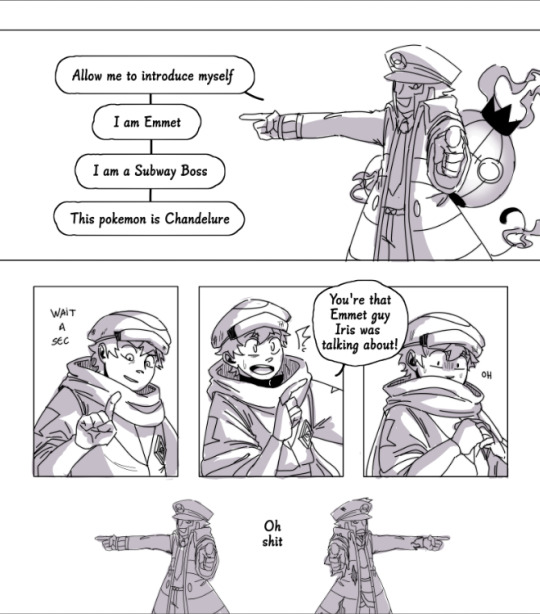
First | Previous | Next
Rei's connecting some dots. He's not liking it tho
#submas#subway bosses#submas au#subway boss emmet#emmet#subway boss ingo#ingo#warden ingo#pla rei#rei#chandelure#post pla#pla au#my art#prosopagnosia
670 notes
·
View notes
Text
take this test (takes 2-3 min):
I read an interesting study about the link between autism and prosopagnosia (face blindness) and I was curious :)
#augmented polls#poll#polls#tumblr polls#pollblr#autism#neurodivergent#autistic#actually autistic#prosopagnosia#face blindness#face blind
15 notes
·
View notes